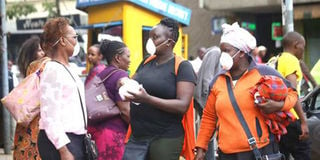Coronavirus: Why we must listen to experts

A hawker (in black T-shirt) sells face masks on Moi Avenue in Nairobi after the Ministry of Health announced the first confirmed case of the new coronavirus in the country. PHOTO | KANYIRI WAHITO | NATION
What you need to know:
- Once within a country, it is spread by person-to-person contact and by contact with contaminated surfaces.
- We are discouraged from sneezing and coughing openly in public places, as well as from touching our eyes, noses and mouths with unclean hands.
The world has now entered uncharted territory in the health sector, with the coronavirus disease (Covid-19) being declared a pandemic by the World Health Organisation (WHO).
Everyone is at risk of being infected, and the number of deaths is expected to continue increasing. As governments scramble to take measures to control the damage due to this infection, life is going to change in drastic ways for many of us.
CONTAMINATED SURFACES
The most important consideration is that since the first cases were reported in China late last year, the virus has been hopping from one country to another mostly by air travel.
Once within a country, it is spread by person-to-person contact and by contact with contaminated surfaces.
As happens with every significant global issue, there is a lot of speculation around this illness.
Before the end of this past week when the first case was confirmed in Kenya, many Kenyans were content to spread the silly rumour that the virus could not thrive among Africans or on the African continent.
It appears to be in our nature to consistently appeal to supernatural forces whenever faced with a serious threat instead of taking practical measures to deal with emergent threats. Many others have come up with all sorts of explanations as to the source of the virus.
HEALTH CHALLENGE
When it comes to public health, it is important to understand the science behind a problem in order to be able to control it. In the case of Covod-19 we know that this particular coronavirus is responsible, and it is different from previous viruses as a large number of those infected will not show any signs or symptoms even when they are infectious.
While its fatality rate is not as high as that of other viral illnesses like Ebola, it is known to cause pretty serious disease in many of those infected.
While we grope around for more sophisticated solutions for this new public health challenge, there are simple measures which if applied by everyone can end this pandemic within a few weeks.
If we all practised simple hygiene measures like keeping our hands clean by cleaning them regularly and using hand sanitisers where necessary, the risk of spreading the infection would be significantly reduced.
SNEEZING
We are also discouraged from sneezing and coughing openly in public places, as well as from touching our eyes, noses and mouths with unclean hands.
Failing all this, we are encouraged to practice social distancing by avoiding handshakes and other close contact to reduce the chances of getting infected.
Unfortunately this last measure is also the most difficult to observe and we may have to radically change the way we do things in this country if we are to stay safe.
Now that it is confirmed that we have this virus in the country, we must move our public health systems to the highest emergency setting, and brace for the inevitable increase in demand for services over the coming days.
In the meantime, let us all practice the simple hygiene measures recommended by our public health authorities if we hope to minimise the damage due to Covid-19.
Lukoye Atwoli is an associate professor of psychiatry at Moi University School of Medicine; [email protected]





